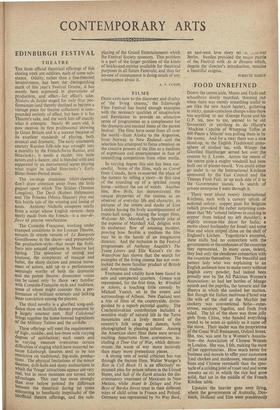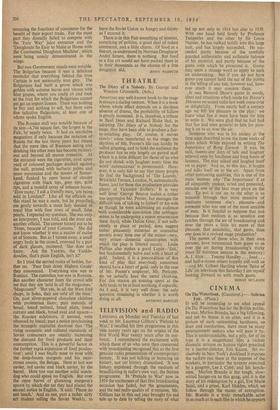-FOOD UNREFINED
DOWN the centre aisle, Mums and Dads and schoolboys slowly marched, thinning out when there was merely something useful to see (like the new Ascot heater), gathering in sticky, queue-conscious clumps when there was anything to eat (George Payne and his G.P. tea, new to me, seemed to be old favourites) or anything to do (Sharp's 'Machine Capable of Wrapping Toffee at 600 Pieces a Minute' was pulling them in by the score). And for a treat there was a nice stand-up, in the English Traditional atmo- sphere of sloshed tea, with Wimpy the Glorified Hamburger served hot over the counter by J. Lyons. Across the centre of the centre aisle a mighty windmill had been built out of plaster-board. You could either go under it—to the International Kitchens sponsored by the Gas Council and the Thames Frost Fair, or up each side of it to the Government stands. In search of private enterprise I went through it.
There were about twenty International Kitchens, each with a cursory splash of national colour: copper pans for Belgium (which provoked the rather surprising com- ment that 'My 'usband believes in cooking in copper' from behind my left shoulder); a slightly mosque-like decor for India; a motto about husbandry for Israel; and some blue and white striped china on the shelf of England's kitchen. Yugoslavia's excepted, these stalls had no connection with the governments or the embassies of the countries they represented. In many cases, indeed, they had only the slenderest connection with the countries themselves. The beautiful and patient lady who was explaining to an English audience how to make curry without English curry powder, had indeed been proudly sent by the All Pakistan Women's Association; so had her bottles of Mango squash and the paprika, the tamaric and the dhanya in which she cooked her mutton. But though the Italian maitresse d'hotel was the wife of the chef at the Mayfair her cookery was conventional Soho—mine- strone, escalope, fagolini, and fresh fruit salad. The hit of the show was three jolly girls from China, who handed everything round to be eaten as quickly as it came off the stove. Their leader was the proprietress of' the Great Wall Restaurant, Oxford Street. She, too, was sent by a Women's Associa- tion—the Association of Chinese Women in London. She was, I felt, making the most of her opportunities. How much better for business and morale to offer your customers fried chicken and mushroom, steamed meat buns and Chinese vermicelli than the spec- tacle of a colding joint of roast veal and some tomates au riz in which the rice had gone solid, that sat in the middle of the French Kitchen table.
Upstairs the heavier guns were firing, where the governments of Australia, Den- mark, Holland and Eire were ponderously assuming the functions of commerce for the benefit of their export trade. For the most part they dismally failed to compete with the 'Easy Way' juice extractor and the 'Doughnuts So Easy to Make at Home with the Continental Doughnut Machine', which were being noisily demonstrated in the wings.
But two Government stands were notable. The Bulgarian because it was a delicious reminder that everything behind the Iron Curtain is not necessarily iron grey. The Bulgarians had built a grove which was golden with autumn leaves and vinous with blue grapes, where you could sit and look at the fruit for which the Bulgarians cannot yet get an import licence. 'There was nothing to buy and nothing to sell, but there were five talkative Bulgarians, at least one of whom spoke English.
The Russian stall was notable because of size-4,744 square feet, the largest in the air, by nearly twice. It had an inevitable gnetism if only because the isolation of ssia for the last thirty years has meant t the mere idea of Russians eating and 'ng like other men has become mysteri- and beyond all reason romantic. At entrance were the cigarettes, yard upon rd of coloured packages stacked against o wall, printed with barbaric palms and snow mountains and the towers of Samar- kand, flanked by open boxes of slender cigarettes with black tips, grey tips, gold and a tasteful array of tobacco leaves. 'How many,' I ask a friendly man, 'are being sold in London?' Like all the officials on this stand he was a mute, but he propelled me gently towards a stout lady dressed in royal blue with four rows of small, false pearls. I repeated my question. She was only, an interpreter, I was told, and she must ask another official. The answer turned out to be 'None, because of your Customs.' She did not know whether it was a matter of excise or of licences. But as I turned away, a small angry body in the crowd, crowned by a pair of dark glasses, muttered, 'She does not know. Ask the Yankles, the Yankle- doodles, that's plain English, isn't it?'
So I tried the serried ranks of bottles, fur- ther on. 'Pear fruit drink Highest Grade' they announced. Everything else was in Russian. The custodian too was in Russian. But another character from the crowd tells me that they are 'sold in all the magazines.' ,'Magazines?' But yes, in all the West End shops, in Soho, they are sold allthe time.' On, past silver-papered chocolate children with proletarian faces; past mounds of bread, bread twisted, bread plain, bread currant and black, bread oval and square— the Russian exhibitors, it seemed, were obsessed by bread; past a notice proclaiming the strangely capitalist doctrine that 'The rising economic and cultural standards of Soviet consumers are steadily increasing the demand for food products and their consumption. This is a powerful factor in the further rapid expansion of food produc- tion'; until I was finally nose to nose with the deep-frozen sturgeon and his mon- strous cousin, the Beluga. Here at last was caviar, red caviar and black caviar, by the barrel. Here too was another solid watch- dog who could speak no English. But over the open barrel of glistening sturgeon's spawn by which she sat they had placed the second notice in English. 'It said: 'Please do not touch.' And so out, past a rather dirty art student selling the Soviet Weekly, to
,
ti
leave the Soviet Union as hungry and thirsty as I entered it.
There is in this Fair something of interest, something of politics, a great deal of naked commerce, and a little charm. Of food as a fine art, as understood by Norman Douglas or Andre Simon, there is nothing. But food as a fine art would not have packed them in in their thousands as the chance of a free



































 Previous page
Previous page